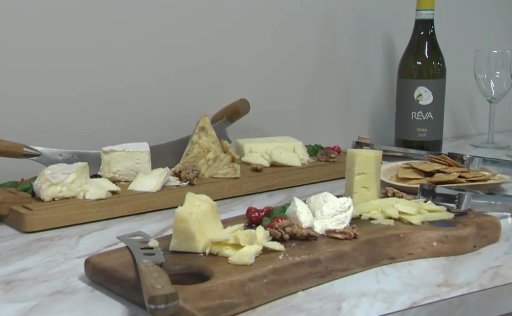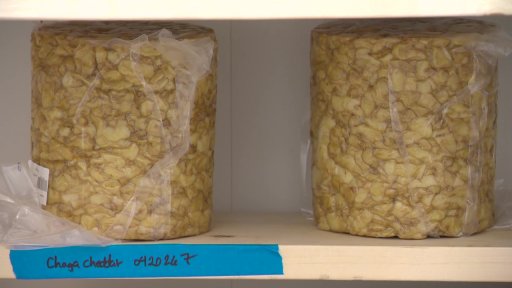Professional cheesemaker Ian Treuer is living his dream.
He first started making cheese more than a decade ago: “I was looking for a hobby and it was that or make beer — and I don’t really drink.”
Like most rookies, it wasn’t smooth sailing at first.
“That first cheese was a hockey puck. It was hard… but I was determined to eat it,” Treuer said.
Treuer kept working at it, which eventually led to teaching classes and working at smaller cheese operations. Then in 2019, he was asked to become the head cheesemaker at Lakeside Dairy in Sturgeon County, about 45 kilometres north of Edmonton.
“I spent 20 years in another career and then the opportunity to work in cheese kind of arose. I have a very understanding and supportive wife, who allowed me to leave a really good job to pursue cheese.”
Read more:
Calgarians find DIY solution to get their beloved ‘Holy Grail of cheese’ from Denmark
Treuer calls the process of making cheese his happy place. He says no cheese is identical, as the formula is influenced by the subtle differences in each batch of milk.
“There’s certain aspects to cheese making [I love] where we’re turning liquid into a solid. There’s some science-y stuff to it — it’s an art form — and no cheese make is the same,” Treuer said.
The newly built cheese plant has been in operation since September. It’s a real farm-to-table operation: the facility uses milk from cows on the farm itself — a rarity for most cheese producers.
“The cows have a nutritionist that designs their feed. And that, to me, makes it a better milk to use.”
Lakeside Dairy owner Jeff Nonay is known in the Edmonton food scene for his beef. He says that helped get his foot in the door of local restaurants and retailers and on the minds of consumers — but his ultimate goal was to add cheese to his offerings.
“It was produced only 200 feet away on our dairy farm, where it all started, and transformed here to something consumers can really wrap their taste buds around,” Nonay said.
“I’m excited for that experience and to connect people to agriculture in Alberta.”

A charcuterie board of the cheeses Lakeside Dairy has made.
Les Knight/ Global News
A tragedy ignites a dream
Nonay has had cheddar on the brain for a decade, after visiting a Quebec dairy farm with its own cheese plant on site.
Three years-ago, a devastating fire gutted a barn and killed 140 cows at the farm that has been in operation for decades.
“We lost a building, we lost animals and we needed to make decisions on what that meant on the farm,” Nonay said.
He said the fire was a fork in the road: a chance to look at what was lost and make decisions on other ways to run the business — and that included making cheese.
After Nonay rebuilt the barn in 2018, he started construction on the cheese plant.
“I could see in Quebec how it was done, and what we needed to do,” Nonay said — but then the COVID-19 pandemic shut the world down.
“Adapting that and bringing the whole thing together in a short time frame under those pressures certainly didn’t happen without some people that stepped up for us,” he added.
Read more:
Edmonton entrepreneurs take on challenge of launching businesses during COVID-19

Cheese aging at Lakeside Dairy before it is ready for sale.
Les Knight/ Global News
Like aging cheese, patience is key. Nonay kept pushing, had the plant completed and is now selling his products in the Edmonton area. Treuer said it’s been a long, but rewarding journey.
“That is an awesome feeling but also humbling at the same time, that something I create is out there and people are enjoying it,” Treuer said.
The cheese is sold at several independent businesses in and around Edmonton, including D’Arcy’s Meats, Popowich Meat Company, Meuwly’s, Fleisch and Effing Seafoods Market (St. Albert).
It’s also included in menu items at Woodshed Burgers, Glass Monkey, HomeRoom Diner (Devon), and SABOR Restaurant.
“A lot of the businesses that we work with have actually expanded,” Nonay said. “We’re in the same company of craziness, where we don’t really know if it’s good or bad, but we are all doing our best to run our businesses and meet the needs of consumers.”
“I hope that the community continues to support us.”
Read more:
Social media buzz amid COVID-19 leads to Edmontonians rushing for local carbs
A new taste
Nonay and Treuer are working together to expand their offerings, experimenting and trying new techniques.
“You get so much out of the same cheese. We got four different cheeses out of our cheddar program,” said Treuer.
“Our washed brine cheese and our brie cheese are made at the same time — but how we age it, makes it taste like a different cheese altogether.”
Nonay and Treuer have come up with a new flavour made from a type of fungus that is often found growing on birch trees in Alberta forests.
Nonay was drinking tea made from the chaga mushroom when he wondered how the flavour would translate into cheese.
“We soak the curds in a chaga tea and that one, we only age for six to seven weeks, because we want that nice flavor between the two,” Treuer said.
The world’s first chaga cheese has a fairly mild taste with a slight nutty flavour.
“It’s truly amazing, where we have been able to come up with something unique in the world of cheese.”

What chaga cheddar looks like while it’s aging. The cheese curds are soaked in chaga tea and aged for a few weeks before its packaged.
Les Knight/ Global News
